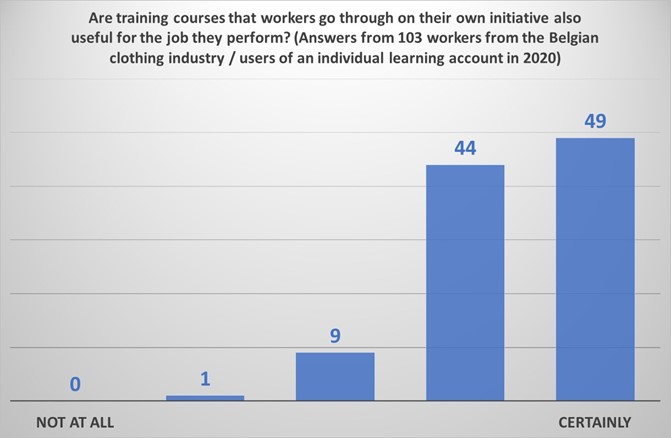20 years of experiences with an individual learning account in the Belgian clothing industry
Introduction
In the framework of the European Commission Work Programme 2021, one of the New Policy Objectives is to assess the possible impact of an Individual Learning Account. This plan is part of the follow-up to the European Education Area and the updated skills agenda. Maybe most interesting, the learning account fits in promoting our European Way of Life, one of the six major policy objectives.
We would rather expect a learning account in a socio-economic atmosphere, oriented to the labor market, but it can certainly be recognized that strengthening the autonomy and self-reliance of workers is completely in line with the ideas and principles of our European society.
An individual learning account does indeed start with the insight that workers too are able to take their responsibility when it comes to acquiring and strengthening competencies that should support their position and perspectives on the labor market. This idea is at the basis of the individual learning account of € 640 that has been offered to workers in the Belgian clothing industry since 2002. Thousands of workers have already used it to finance various courses (languages, IT, fashion, …) on their own initiative. We are happy to share our key learning points.
The learning account and company training
The learning account system, as we know it in the Belgian clothing sector, fits into the business world and is available for professionally active workers. Training courses that are followed with a learning account complement the company training courses, which form the most important component in competence enhancement. Company training courses can be situated in a triangle.
- All newcomers receive instructions and training to operate the necessary hardware or use software in the light of the applicable quality standards. Every new software version, every production changeover, automatically includes the necessary additional training for workers. Such training is synchronized with the business process and is necessary to keep it going.
- The same can be said for training in the area of prevention and safety, although these training courses are more proactive and it can sometimes be perceived that they are less necessary for the continuity of the business process. Because of this hesitation, it is often about legally required, and thus government-regulated training.
- In a third corner we find courses with a greater distance from the production process, such as those relating to soft skills and personal development (communication, languages, etc.). It often concerns reactive training, but which are nevertheless considered useful and sometimes necessary to support good cooperation and communication in the company.
Developing and offering company training in this triangle is one of the essential tasks of every employer or HR manager. An empty corner in the triangle usually indicates a serious problem in company management, by the way.
With the learning account, we distance ourselves from the triangle and we talk about supporting training at the initiative of the worker, so no longer initiated by the employer and not necessarily linked to the business process. With the learning account we recognize that training outside the triangle can also be useful and necessary and therefore deserve support. The criterion is then the relevance for the broader labor market, including one’s own company, admittedly. Such a logic is a policy logic and not at all self-evident. Doubts about the labor market relevance of training that a worker is allowed to choose himself is indeed the most important barrier to the introduction of a learning account, in whatever form.
A learning account system therefore starts from the recognition of the right to self-determination and the present, necessary competences for this among workers. But the system cannot be viewed separately from a way to monitor the labor market relevance of the supported training courses.
This is done in two ways for workers in the Belgian clothing industry. On the one hand, workers are always advised and possibly offered (professional) career guidance, in order to elaborate a labor market-oriented personal training plan. In this way, the reinforcement of the opportunities on the labor market through a learning account can be substantiated and monitored.
In addition, the social partners from the Belgian clothing sector, who finance the learning accounts, have defined training themes that can – intrinsically – enhance labor market opportunities, in order to validate and reinforce the purpose of the system (https://www.mytrainingbudget.be/).
The learning account in practice
With about 10,000 workers, the Belgian clothing industry constitutes only a limited share but a dynamic part of the labor market. Every year, about 200 workers apply for a learning account as offered by the sector. That is not a large group, certainly not compared to the 3000 trained workers who rely on sectoral support through the employer.
For the past 20 years, offering support for training courses that workers can follow on their own initiative has never caused a shock wave of applications in Belgium, which is not surprising in a production environment with workers who do not exactly look back on a rich educational curriculum. So training on the worker’s own initiative is not exactly massive, but it is a particularly useful choice for those workers in question.
The regular evaluations among the users of a learning account give us a good idea of the added value of the support. A large majority of workers recognize that the learning account is an incentive to follow training (87%), and motivates them to complete the training (90%). At the same time, most workers (93%) indicate that they would probably have followed the chosen training without the support of a learning account. Apparently, the labor dynamics are therefore too compelling to hold back workers from improving their skills themselves, even if there is a cost connected. The added value of the learning account must therefore be situated in the first instance in the area of the workability of jobs, strengthening motivation in particular, especially when we see that almost all workers (96%) confirm the motivation that emanates from a learning account.
Of course, job motivation is something else, but here too we get little else than a consistently positive image of workers who integrate better into their jobs, thanks to the growth and development opportunities they get. They don’t care where the financial support comes from.
Whether a learning account also enhances retention, we do not know, because we do not continue to monitor the trained workers in the long term. But in our 20 years of experience with learning accounts, we found no evidence at all for workers leaving their company because they were allowed to choose their own training.
Moreover, we notice that most workers do opt for training that is useful for the job they do (see the graph). In other words, the accusation that a learning account mainly serves to support other than professional training, cannot be endorsed on the basis of the experiences in the Belgian clothing industry.

Finally, the average amount of the training bills paid to the Belgian clothing industry workers is € 530, which reimburses registration costs and travel. The maximum amount of the support is € 640 annually and we see that only about 30% of the workers use the full amount. Thanks to the support of the sector, a large majority of workers in the Belgian clothing industry can therefore invest time and energy in their job and career, without sacrificing in other areas, that means strengthening the autonomy and self-reliance of workers, the way Europe wants it.
Rob Senden, director of IVOC-IREC, the training center of the Belgian clothing Industry


